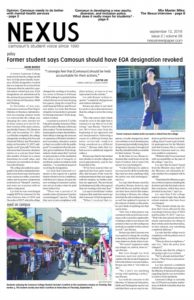Students with invisible mental illnesses—for example, depression, anxiety, and borderline personality disorder—are largely forgotten when it comes to inclusion at post-secondary institutions, such as Camosun College.
Despite the fact that roughly one in five people here in Canada suffers from mental-health barriers, students with mental illnesses are often left out of school events and activities due to the hurdles that they face. This means that somewhere around 20 percent of students are marginalized in their pursuit of success.
Camosun does not do enough to change this.

As someone who suffers from an anxiety disorder, I can testify to experiencing difficulties due to mental illness when participating in clubs and leadership activities. These difficulties often leave me feeling discouraged, and I sometimes allow risky opportunities with large payoffs to pass me by as a result.
Universities, scholarship foundations, and student-based organizations place a great deal of emphasis on extracurricular activities. It’s expected that any well-rounded student will get involved in as many groups as they can; the connection between students and the communities they lead can build confidence and offer the student life-changing experiences.
When students with persistent multiple barriers see the benefits these activities offer, it’s disheartening to feel they will be forced to continue struggling while others push forward with fewer obstacles, feeling welcomed into these groups without discrimination.
Although it is possible for someone with severe depression or anxiety to be successful in a social setting and in school activities, it is extremely difficult. Without proper support from their school, many of these students will coast by anonymously, often neglecting to search for help as they push themselves to their limits to achieve their dreams. At the University of Victoria, there’s a program that allows student leaders to focus their efforts promoting UVic’s Student Mental Health Strategy. They use research and planning to create an environment that allows students with mental illnesses to participate as leaders in their community while breaking down the barriers that often exclude them from doing just that.
It is this kind of strategy that allows these intelligent, creative, strong individuals to reach their full potential in post-secondary with much less difficulty. If Camosun wants to be inclusive, it needs to make students feel comfortable seeking the support they need. We must feel that getting help is both expected and accepted. The college does an okay job at making the Centre for Accessible Learning available for students, but many students are not visibly disabled and do not feel comfortable seeking the type of support that the centre offers.
We need more. Camosun must do better in assessing students for invisible mental-health conditions so that it can better include those students and support them in their success, not just in academics but also in socialization, leadership, politics, and sports.
